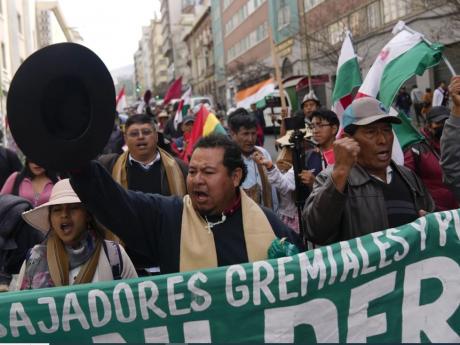Bitter political fight in Bolivia is paralysing the gov't as unrest boils over economic crisis
LA PAZ, Bolivia (AP) — Protesters streamed into Bolivia's capital, throats hoarse from chanting and feet blistered from a week of walking along the national highway.
The throngs of street vendors in the South American country's vast informal work force ended their nearly 100-kilometre (60-mile) march from Bolivia's mountain-rimmed plains with a call that summoned years of growing anger over the nation's dangerously depleting foreign-exchange reserves: “We want dollars!”
With prices surging, dollars scarce and lines snaking away from fuel-strapped gas stations, protests in Bolivia have intensified over the economy's precipitous decline from one of the continent's fastest-growing two decades ago to one of its most crisis-stricken today.
“We can change the country because we are the engine of production,” Roberto Ríos Ibáñez, secretary-general of Bolivia's Confederation of Merchants, said as weary protesters broke for lunch around him in the capital's traffic-snarled centre.
“The government doesn't listen. That's why we're in the streets.”
Bolivia's financial quagmire stems, at least in part, from an unprecedented rift at the highest levels of the governing party.
President Luis Arce and his one-time ally, leftist icon and former President Evo Morales, are battling for the future of Bolivia's splintering Movement for Socialism, known by its Spanish acronym MAS, ahead of elections in 2025.
The political fight has paralysed the government's efforts to deal with the deepening economic despair and analysts warn that the social unrest could explode in the historically turbulent nation of 12 million people.
Cracks in the governing party opened in 2019, when Morales, then Bolivia's first Indigenous president, ran for an unconstitutional third term. He won a contested vote plagued by allegations of fraud, setting off mass protests that caused 36 deaths and prompted Morales to resign and flee the country.
After an interim government took control in what MAS called a coup, Morales' chosen successor, Arce, won election on a campaign promise to restore prosperity to Bolivia, once Latin America's mainstay source of natural gas.
Arce had been Morales' finance minister who oversaw years of strong growth and low inflation, but assuming the presidency in 2020, he encountered a bleak economic reckoning from the coronavirus pandemic. Diminished gas production sealed the end of Bolivia's budget-busting economic model.
Still hugely popular among Bolivia's Indigenous communities, coca growers and union workers, Morales saw an opportunity. After returning from exile, the charismatic populist announced plans last year to run in the 2025 vote — setting himself on a collision course with Arce, who is expected to seek re-election.
Follow The Gleaner on X, formerly Twitter, and Instagram @JamaicaGleaner and on Facebook @GleanerJamaica. Send us a message on WhatsApp at 1-876-499-0169 or email us at onlinefeedback@gleanerjm.com or editors@gleanerjm.com.

